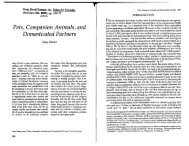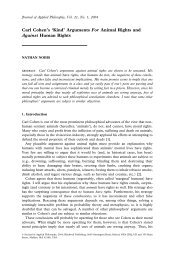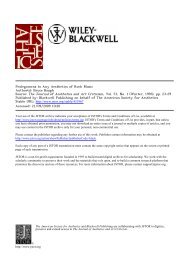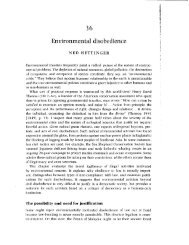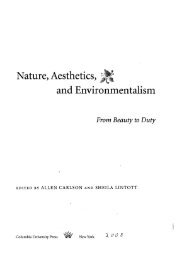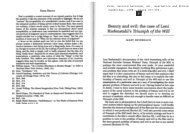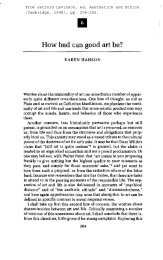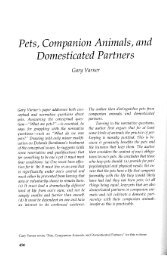Anthropocentrism vs. Nonanthropocentrism: Why Should We Care?
Anthropocentrism vs. Nonanthropocentrism: Why Should We Care?
Anthropocentrism vs. Nonanthropocentrism: Why Should We Care?
You also want an ePaper? Increase the reach of your titles
YUMPU automatically turns print PDFs into web optimized ePapers that Google loves.
ANTHROPOCENTRISM VS. NONANTHROPOCENTRISM<br />
179<br />
sometimes appropriate to take these attitudes toward the natural world, or even<br />
insofar as we want to avoid theories that reject this possibility out of hand, we<br />
have reason to worry about anthropocentrism. Itʼs one thing to say that ethics<br />
shouldnʼt recommend love-of-nature to everyone; itʼs another thing to say that<br />
to love nature is to make a mistake.<br />
Thus from the point of view of norms for feeling, anthropocentrism does<br />
have very different practical implications from nonanthropocentrism, and this<br />
is a difference about which we have reason to care. Even if anthropocentrism<br />
leaves us with good policy recommendations, it will constrain the ways in<br />
which we think it makes sense to care about the natural world. Specifically, it<br />
will rule out certain ways of caring as inappropriate to nonhuman objects. The<br />
environmentalist literature has at least given us some good reasons to worry<br />
about whether these are constraints we should be willing to accept.<br />
Now, given the enormity of the environmental problems we currently face,<br />
I am not arguing that we should all just turn our attention inward and work on<br />
getting our feelings straight. Adopting good environmental policies and getting<br />
people to act in environmentally responsible ways should be a priority, especially<br />
given the urgency of many environmental problems. But there is room within (or<br />
perhaps alongside) that project for asking how we ought to feel about the world<br />
we live in. In that context, the differences between anthropocentrism and nonanthropocentrism<br />
are considerable and, I think, still well worth our attention.<br />
NOTES<br />
An earlier version of this paper was presented at the International Society for Environmental<br />
Ethics and International Association for Environmental Philosophy Joint Conference<br />
in June of 2004. I am grateful to Simon Keller for his astute commentary and to<br />
the conference participants for many useful comments and criticisms. I thank Elizabeth<br />
Anderson, Alan Carter, Stephen Darwall, Patrick Frierson, Lori Gruen, Avram Hiller,<br />
Dale Jamieson, Jeff Kasser, Robert Mabrito, Scott McElreath, and Doug McLean for<br />
helpful discussions of ideas presented here. In addition, I thank two anonymous reviewers<br />
for their thoughtful comments.<br />
1<br />
Nortonʼs discussion of the convergence hypothesis can be found at Norton 1991:<br />
237–43.<br />
2<br />
This phrase is from Light 2002: 436.<br />
3<br />
It is feelings rather than actions, for example, that distinguish Aristotleʼs virtuous person<br />
from the merely continent person. See EN 1147b20 ff. For historical treatments of the role<br />
of feeling and sentiment in ethics, see Darwall 1995 and Bell 2000. For contemporary<br />
accounts, see Oakley 1992 and Nichols 2004.<br />
4<br />
While this is a claim about the value of the nonhuman world in general, it is (at least<br />
in environmental ethics) only controversial in the case of the nonhuman natural world.<br />
Environmental Values 16.1







